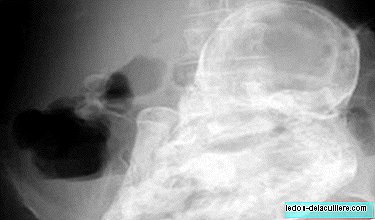
A little over a year ago Lola explained to us what stone babies were. These are ectopic pregnancies, outside the uterus, in which the fertilized egg develops, adhering to a woman's organ, until it dies, stops growing and ends up calcifying.
That calcification makes the fetus looks like stone, and just as we talked about them for a case of abdominal pain in an older woman, it has recently happened that an 82 year old woman He went to the hospital with a similar picture, complaining of a stomachache, and an x-ray, which you see in the picture, revealed that she had a baby of stone inside that she had been with her for 40 years.
This phenomenon is known as lithopedia or lithopedion, which literally translates as "stone child", and there are less than 300 cases documented, as it is a very rare phenomenon. As mentioned, the probability that a pregnancy is ectopic is one in 11,000. And of all ectopic pregnancies, only 1.5% become lithopedia, that is, stone baby.
The case we discussed today has happened in Colombia, at the Tunjuelito Hospital in Bogotá, which was attended by an 82-year-old woman, suffering from abdominal pain, in a picture that was defined, initially, as gastroenteritis. However, the doctors who assessed her noticed something abnormal in the abdomen. At first they suspected it could be gallstones, but then it was decided to carry out an x-ray and thanks to it they found the stone baby.
Apparently the fetus should have been there for about 40 years and, as usually happens, while the woman is in good health does not seem to bother too much, until at an older age, when any little thing bothers much more, they go to the hospital complaining of abdominal pain and, if sought, find the baby. The woman was obviously intervened to extract the calcified fetus and thus alleviate the cause of her ills.
From now on, as is logical and thanks to the fact that there is now more control in pregnancy, the chances of this happening will decrease, at least in the first world, of course, since in poor countries I doubt that there is much control of pregnancy. And of course, as long as the aforementioned controls continue to be carried out, that as we neglect, nothing is privatized, and whoever wants controls will have to pay for them.












